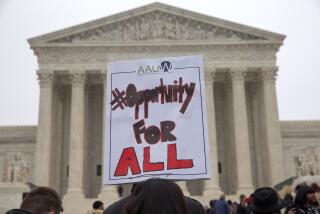Hating One’s Own Kind: Bias or Human Nature? : Discrimination: Such prejudice may be based on gender, race or age. Some women may fall prey to a Queen Bee Syndrome.
- Share via
NEW YORK — Perhaps you know her. The woman who seems to have, well, a problem with other women.
She chooses female friends who are a little less attractive. She complains about women drivers while considering herself the next Andretti. She treats male co-workers with respect while sharpening her claws on female colleagues.
Is it discrimination?
Not according to a ruling this year by a federal judge in Rhode Island.
In the case of a female state trooper who sued the state’s female attorney general, U.S. District Judge Ernest C. Torres said sex discrimination charges brought by one woman against another “are patently groundless.”
But Leslie Wolfe, who heads the Center for Women Policy Studies, said that is nonsense. “Just because a person has ovaries doesn’t make them pro-women,” she said. “It’s the action, not the gender, that’s significant.”
And, some say, just because you’re black doesn’t mean that you’re incapable of discriminating against other blacks. Or, if you’re elderly, that you won’t discriminate against others in your age group.
“Because of the many facets of human motivation, it would be unwise to presume as a matter of law that human beings of one definable group will not discriminate against other members of their group,” U.S. Supreme Court Justice Harry A. Blackmun wrote in 1977, in a case involving Mexican-Americans.
The court ruled in that case that discrimination within a group does occur. But the controversy continues to rage, both in and out of the courts.
* In Detroit, a light-skinned black woman is suing her former boss, a darker black woman, claiming that she was discriminated against because of her skin tone. If she wins, it will be the first successful case of its kind. A similar lawsuit in Atlanta two years ago found no discrimination had taken place.
The backlash reflects the resentment dark-skinned blacks feel because light-skinned blacks get a better deal from society, said University of Illinois sociologist Cedric Herring.
“If you live in a society where color prevents access, then there’s going to be resentment,” said Verna Keith, a University of Arizona sociologist.
* Experts on aging say a phenomenon dubbed the “Not Me Syndrome” exists among some seniors. Elderly people uncomfortable with their aging try to distance themselves from the notion and look down on other old people.
Cathy Ventrell-Monsees, an attorney with the American Assn. of Retired Persons, said some corporate leaders “are the prime examples of the Not-Me Syndrome. They are older and they . . . want to be the stars. They separate themselves from other older workers.”
Leah Dobkin, a housing specialist with the AARP, said it’s often older people who oppose housing projects for the elderly in their neighborhoods.
* Among women--more than half the population--allegations of discrimination proliferate. Barbra Streisand, in an interview on NBC’s “Today” show, complained that female film critics gave more negative reviews to her movie “Prince of Tides” than their male counterparts.
Streisand said the women attacked her personally instead of focusing on her work as an actress and director. “I think there’s a lot of jealousy and competitiveness between women,” she said.
Dr. Alvin F. Poussaint, an associate psychiatry professor at Harvard Medical School, said some women fall prey to a Queen Bee Syndrome, in which a woman alone at the top likes it that way and doesn’t want another woman detracting from her.
“If they get to the top, they get some type of charge out of being the only one. It proves they are great. Another woman making it to their level diminishes her prestige,” he said. “It sometimes occurs among Latinos and blacks too.”
In another scenario, a woman with a negative self-image may project it on other women, Poussaint said. These are the women who complain that women--other women--are bad drivers, or poor at mathematics or simply not trustworthy.
And occasionally, there are unwritten codes of the group that an individual carries out. A woman may be the token female and is expected to hold the (anti-woman) views of the male majority, he said.
Suzanne Gordon, a feminist who has written on women in corporations, believes women may feel the need to prove they’re objective, bending over backwards to appear fair. Unintentionally, they may be harder on other women.
Women want to be “the fairest of the fair and the toughest of the tough, and so you’re not going to give another woman any leeway,” she said.
More to Read
Sign up for Essential California
The most important California stories and recommendations in your inbox every morning.
You may occasionally receive promotional content from the Los Angeles Times.










